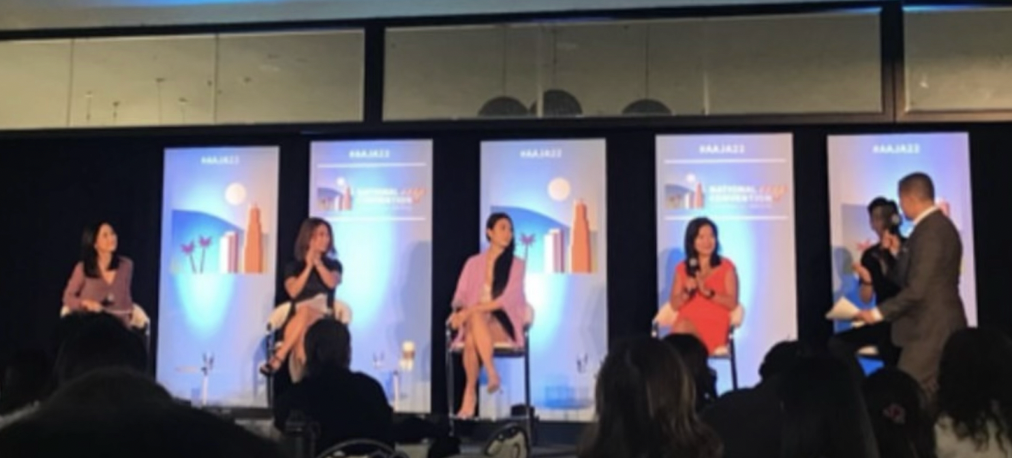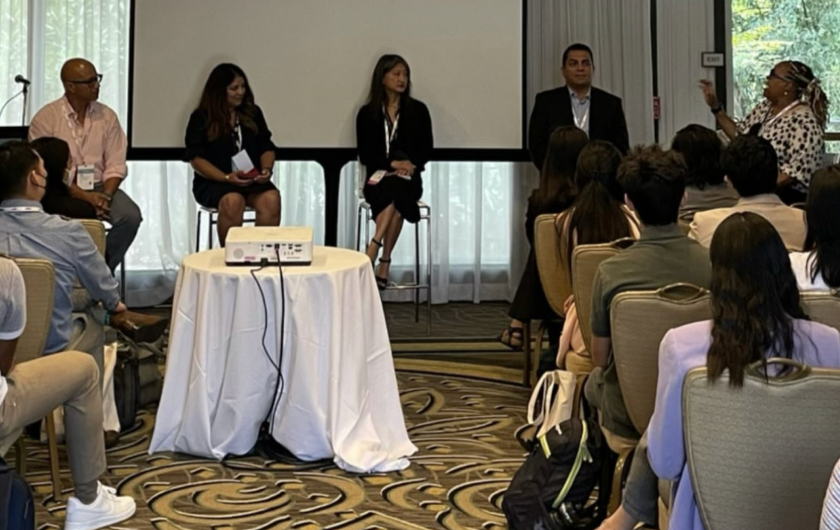Ever experienced imposter syndrome? Had a good story to tell but didn’t know where to start? Struggled with getting sources to open up to you? I delved into solving these problems and more with award-winning journalists at the Asian American Journalists Association’s (AAJA) National Convention in Austin, Texas this summer. The organization, which promotes diversity within the media landscape, held sessions on numerous topics such as “Elevating Diverse Stories,” “Abortion and Identity in the 2024 Election,” “How Journalists Can Become Filmmakers” and “From Crisis to Coverage.”
The convention allowed me to immerse myself in an environment of professional journalists. Earlier in the summer, I experienced a similar atmosphere while interning at a lab, surrounded by experienced researchers for my science research class. Both of these opportunities gave me practice in acting professionally and networking with adults.
Unless otherwise indicated, all images are via author Sarah Gallen.
For instance, I spoke with the ABC News anchor of “Nightline,” Juju Chang, at the convention. She has won numerous awards including a Dupont, Murrow and Peabody award in addition to Emmy’s and Gracie’s. In addition, she has interviewed many influential people ranging from U.S. presidents to Oscar-winning actors. I also spoke with Bay Fang, the President and CEO of Radio Free Asia (RFA), a government-funded non-profit organization that broadcasts and publishes news for audiences in Asia. It offers uncensored news to Asian countries with poor media coverage with little free speech. These countries include China, Tibet, North Korea, Vietnam, Cambodia, Laos and Burma. Winner of the Robert F. Kennedy Journalism Award, Bay Fang believes in democratic values and that educating people on the importance of press freedom allows it to thrive.
During the “Am I Good Enough?: Boosting Self-Confidence and Morale in this Industry” session, I learned several valuable lessons for overcoming self-doubt. First, having a group of friends who share your values can provide support and help you tackle challenges. Second, Lawrence Wu, Producer at NPR, advised that you should “always shoot your shot, but make sure it’s a good shot.” While there’s no harm in taking risks, it’s important to ensure you always put your best foot forward. Millie Tran of the Council on Foreign Relations shared that as journalists, our higher purpose is to “help people understand the world and improve their lives.” Focusing on these principles can enable journalists to better navigate the industry with resilience and clarity.
“The Mark of a Memorable Story” session focused on equipping reporters with the skills needed to craft unforgettable stories under tight deadlines. I learned how thoughtful story construction can elevate storytelling from merely good to truly memorable. A critical step is coming up with the story or the pitch. The three components of a good pitch are intention, conviction and connection. A pitch with intention covers the practical logistics of a story and identifies all the characters. Pitches with conviction humanize issues and draw people in as audiences are naturally attracted to compelling narratives they can relate to. In contrast, a pitch lacking conviction comes across as vague and unassertive. As journalists, our job is to make the audience care and “feel connected with the story. That’s the whole reason we do this—to connect people. If we can do that, we are doing our jobs, and I believe this is the best job in the world” added Jobin Panicker, two-time Reporter of the Year for the National Press Photographers Association.
The “Developing Sources with Integrity and Respect” panel discussion explored the reasons certain communities distrust journalists and strategies for building missing trust. It began by emphasizing that engaging with the media can empower individuals to control their narratives. It gives individuals the agency to ensure their stories are told accurately and respectfully. Sarah Ying Rounsaville, Chief of Strategy at the Vincent Chin Institute, encouraged reporters to empathize with victims by focusing on their experiences and perspectives rather than reducing them to statistics or sensational headlines.
Juju Chang emphasized that communities care less about journalists’ credentials and more about whether they can be trusted. Establishing trust requires a genuine interest in the community’s well-being. Good coverage involves more than just reporting facts; it requires reporting on the challenges and triumphs of a given community with compassion and accuracy.
The panel also suggested that reporters can display emotion to make themselves more relatable. By expressing genuine vulnerability, journalists break down barriers and create a sense of relatability. When journalists and sources share a joint mission to tell the truth, they can work together to create stories that resonate deeply with audiences.
The AAJA Conference reinforced the notion that news is not simply about reporting facts but connecting with people and telling their stories with integrity and respect. As I move forward with my work in journalism, I am reminded of Millie Tran’s words: “Our purpose is to help people understand the world and live better lives. This guiding light serves as a constant reminder of the impact we can have through our work.”
By telling stories that resonate and inspire, we are not just witnessing history but becoming a part of it. After all, journalistic storytelling is one of the most powerful tools for fostering understanding among diverse communities.










